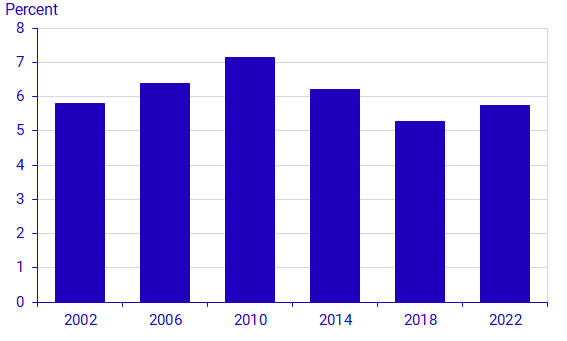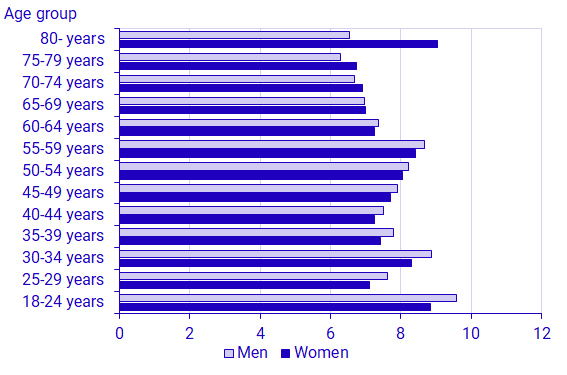General elections, election results:
More older people in the 2022 elections
Statistical news from Statistics Sweden 2021-09-13 9.30
The number of Swedish citizens registered in the population who are eligible to vote in all elections is expected to increase by about 180 000 people and amount to 7.5 million. Around 1 070 000 among these are 75 years and older, which is 150 000 more than in 2018. The number of foreign citizens, who are entitled to vote in municipal and regional council elections, is also expected to increase.
Riksdag, regional and municipal council elections will take place on 11 September 2022. With one year left before the election, Statistics Sweden is publishing preliminary statistics on the number of people who will be eligible to vote in the 2022 general elections.
Number of people eligible to vote continues to increase
The number of Swedish citizens entitled to vote in all elections is expected to increase by almost 180 000 people compared with the 2018 elections and amount to around 7.5 million people. In total, somewhat more women than men will be eligible to vote: 50.4 percent are women and 49.6 percent are men. In addition to longer life expectancy and more young first-time voters, new Swedish citizens also add to the increasing numbers of Swedish citizens eligible to vote in Sweden.
The number of first-time voters in the 2022 elections, that is, people who have reached voting age since the 2018 election, among Swedish citizens registered in the population is expected to amount to around 430 000 people. This means that there will be just over 40 000 more first-time voters than in the last election. Expressed as a proportion of eligible voters, the group of first-time voters will increase from 5.3 percent to 5.7 percent of the electorate. Despite this increase, the proportion of first-time voters is considerably smaller than in 2010, when the proportion exceeded 7 percent of the electorate. The size of the first-time voter group in each election depends on the size of the birth cohorts that reach voting age between the elections.

However, an increase in the number of first-time voters will not lead to an increase in the proportion of young voters. The group of young people aged 18-24 years is expected to be somewhat larger in terms of people, but as a proportion of the whole electorate, the group will be a few tenths of percentage points smaller than four years ago. Increases are mainly expected among older people, in which the group of people aged 75 years and older will grow by 150 000 people compared with the 2018 election. In total, this group corresponds to 14.3 percent of the electorate, which is 1.7 percentage points more than in 2018.

As in previous elections, there are somewhat more men among young eligible voters and there are somewhat more women among older voters. In the 2022 election, the reversal in proportions occurs in the age group 65-69 years, although the differences in this group are minor. In the 2018 election, the shift occurred in the age group 60-64 years. Underlying factors include the fact that although there are more male births than female births, life expectancy is longer for women. Differences related to migration also affect this pattern.
More foreign citizens
The number of foreign citizens who are eligible to vote in regional and municipal council elections is also expected to increase in the 2022 election and amount to 670 000 people, which is just over 130 000 more than in 2018. Since this forecast does not include data on how many of these will become Swedish citizens by the election date, this number is slightly overestimated. In the 2018 elections, the number of foreign citizens increased by around 80 000 compared with 2014. However, unlike among Swedish citizens, the proportion of young first-time voters among foreign citizens is expected to be somewhat smaller at 3.7 percent compared with 4.9 percent in the 2018 election. In terms of the distribution between the sexes among foreign citizens eligible to vote, men account for 54.9 percent and women account for 45.1 percent.
Definitions and explanations
These statistics are produced with the help of Statistics Sweden’s population projections and are based on the population register on 30 June 2021. No forecasts are made on the number of foreign citizens who obtain Swedish citizenship before election day, which means that the number of Swedish citizens is underestimated while the number of foreign citizens is overestimated. The extent of underestimation and overestimation depends on the number of people who obtain Swedish citizenship by election day; 80 000 people obtained Swedish citizenship in 2020.
Preliminary statistics are not produced concerning Swedish citizens registered abroad who are eligible to vote in the Riksdag election; this group amounted to around 170 000 people in the 2018 election.
Foreign citizens who are eligible to vote are those who are citizens in an EU country, Norway, or Iceland, and citizens in other countries who have been registered in the population for three years before election day, and are 18 years or older on election day.
These statistics are published in Excel tables and are presented by Riksdag election district, county, municipality and by city district in Stockholm, Göteborg, and Malmö.
Feel free to use the facts from this statistical news but remember to state Source: Statistics Sweden.
